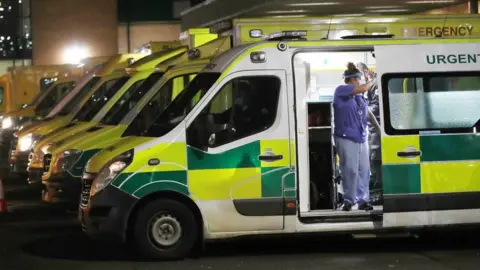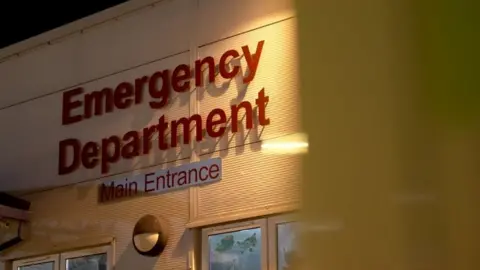Covid-19: One-in-five ambulance staff currently off work
 PACEMAKER
PACEMAKERMore than one-in-five Northern Ireland Ambulance Service (NIAS) staff are off work, its medical director has said.
Dr Nigel Ruddell said more than 200 were off due to exposure to Covid-19, while about 100 others were off sick for other reasons.
The service has about 1,400 staff, most of whom are front-line workers, Dr Ruddell said.
On Thursday night NIAS warned even the most urgent ambulance calls could face a delayed response time.
It said this was partly because of staff absences and also a delayed turnaround time at hospital emergency departments.
Northern Ireland has seen record Covid case numbers in recent days with the spread of the Omicron variant.
"We are prioritising as best we can," Dr Ruddell said.
'Increased risk'
Speaking to BBC Radio Foyle, he said potential stroke patients and people who may have had a heart attack were experiencing increased waits.
"We prioritise all calls and will always do our absolute best to get an emergency ambulance response out to those most critical calls, those immediately life threatening calls, but we are seeing patients who are presenting with symptoms of potential stroke for example who are waiting one, sometimes two hours for an ambulance to arrive," he said.
Dr Ruddell said anyone forced to wait too long for an ambulance "faces increased risk".
He said there were now serious concerns that "there will be a time when we simply do not have an ambulance to send to the next emergency call that arises in the community".
"There are some occasions where it may be quicker, and I personally had to do this yesterday, to advise a patient to be transported by their family because they will arrive at hospital and hopefully start their treatment quicker than we would have an ambulance arrive at their house," Dr Ruddell added.
"We have to make a very fine-balanced judgement call, is it safe for somebody to travel in a car, can they physically be got into a car and be transported safely by relatives?
"We are balancing that against those cases where it is important they start getting definitive care."
Allow X content?
Dr Ruddell said on Friday morning there were 55 patients waiting for an ambulance.
Normally this figure would be about 12, he said.
On Thursday, Northern Ireland's Department of Health reported three more Covid-19 related deaths and 4,701 new cases of Covid.
At a meeting of the Stormont Executive, no further restrictions were introduced, however, ministers agreed to cut the number of days a Covid-positive person would have to self-isolate for, reducing it from 10 days to seven.
The move is designed to avoid a "workforce crisis", according to First Minister Paul Givan.
This rule change applies only to people who can produce negative lateral flow tests on day six and seven.
'Extreme pressure'
On Thursday evening, a number of Northern Ireland's health trusts made appeals related to the pressures they were experiencing.
The Southern Trust said it would temporarily suspend visiting at all of its sites and facilities from midday on Friday.
This was in response to "continued pressures, the significant rise of cases of Covid-19 in our community and in order to protect patients, visitors and staff".

The trust also made a social media appeal for nurses or healthcare assistants who were available to attend work on Thursday evening or Friday.
The South-Eastern Trust also warned that the Ulster Hospital in Dundonald was facing "extreme pressure".
In a social media post just before 17:00 GMT, it highlighted there were more than 135 patients in its emergency department and 55 people were awaiting admission.
It cautioned: "If your condition is not life threatening you will have to wait a very long time."
Both Antrim and Causeway hospitals were also "under extreme and sustained pressure", according to the Northern Trust.
It urged people to only attend the sites if they required emergency care.
Visiting is currently suspended at the Western Trust's hospitals and facilities and is to be reviewed on Friday.
Announcing the move, the trust had said this was because of "continued pressures on our hospitals/care facilities and high levels of Covid-19 transmission".
